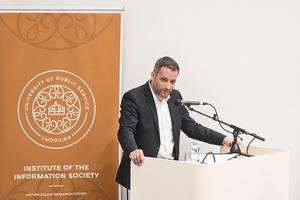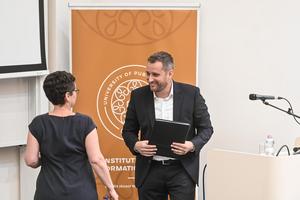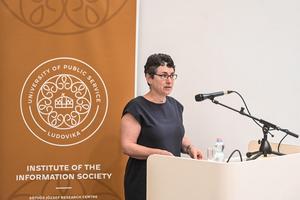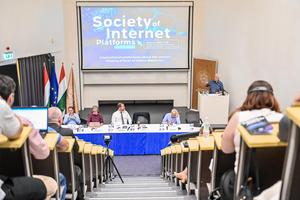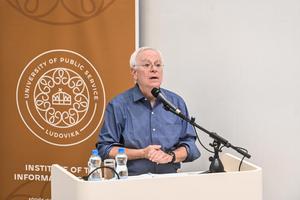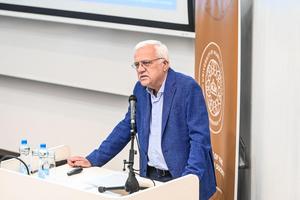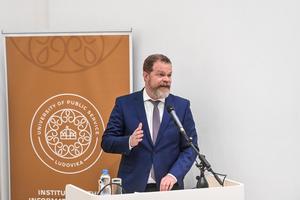On 20 June, the Institute of the Information Society at the University of Public Service organised an international conference on the social impact of internet platforms.
The event was opened by Bernát Török, Head of the Institute. In his speech, he highlighted Europe's pioneering role in setting regulatory standards for platforms, which is referred to overseas as the "Brussels effect". Previously with the GDPR, then the Digital Services Act and the Digital Markets Act, and now with the Artificial Intelligence Regulation, the EU is clearly ahead of the rest of the world. But it should also be seen, he added, that the adoption of the relevant laws is only the beginning of the work: how to apply these rules in a way that is in line with reality seems to be a bigger regulatory challenge. To do this, it is important to cooperate with US experts, as the tech giants affected by the regulation are based overseas.
Julie Cohen, professor at Georgetown University, began her keynote speech on Informational Capitalism, Digital Infrastructures and Information Society Governance with Károly Polányi's thoughts on industrial capitalism. In the last 60-70 years there has been a new transformation, which has led to the emergence of information capitalism, as the professor wrote in his work Between Truth and Power. The reasons for this are (1) the private ownership of intangible resources, (2) the 'dataification' of labour, land, money and people, (3) the fact that the arena of barter and trade has moved from markets to platforms. Polányi, the professor continued, believed that land, labour and money should not be considered as commodities, because their marketization generates social problems. This is indeed what has happened, just think of the bank failures, the gutted farmlands or the exploited workers. Modern English labour law, banking law, for example, and the other regulatory instruments we know today, were created to deal with these changes. In connection with the current transformation, where factors of production are embedded in digital platforms as commodities, it is worth considering whether the previous legal institutions are still operational - raised by Julie Cohen. What can justice mean in this conceptual framework and how can it be restored? - asked the question regarding the regulation of tech giants. These structures, he said, are very difficult to regulate and supervise. The professor expressed concern about EU efforts and legislation in this direction, pointing to the difficulties of implementation.
Rolf H. Weber, professor of law at the Zurich University, then distinguished between two types of platforms in his presentation on transparency in digital platforms: the business-oriented platform (which is linked to areas of law that need to be regulated, such as competition law, consumer protection or labour law) and the communication and society-oriented platform (which raises issues of content moderation or fake news). The speaker described in detail the challenges related to transparency, and then discussed possible solutions to these challenges, including accountability, sanctions, auditability, and conditions for observability. As regards the new legal approaches, he presented EU and Japanese legislation and also mentioned about the practice in the Far East.
Zsolt Ződi, senior research fellow at the Institution of Information Society of UPS, spoke about the protection of users of digital platforms. As he said, the regulation of this issue gained momentum in the late 2000s, and the protection of users is one of the main drivers behind the recent emergence of platform law. The real progress in this area came in 2017, and the speaker also gave a detailed overview of the legal regulations. As the main features of European platform regulation, he highlighted: there is no general obligation for monitoring today; regulation is mainly ex ante, i.e. preventive or compliance type, which relies on co- and self-regulation, and the basis of justification is the creation of consumer protection. Will all this work in practice? - he asked the question. In his reply, he said: it is not yet known, experiences are contradictory. What is certain, however, is that in the first year of the legislation's implementation, thousands of procedures have been launched and platforms are paying more attention. And this is a positive turn.
The participants of the day-long event - among many other topics - could also hear presentations on current issues of social media, freedom of expression and content regulation.


